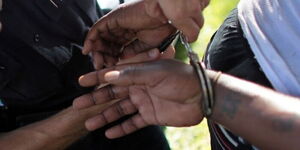Kenya Bureau of Standards (KEBS) Director Charles Ongwae has confirmed that the contraband sugar contains copper and lead.
According to the KEBS director, Ongwae a test done on the contraband sugar that has flooded the market affirmed that there were 20.7 milligrams of copper per kilogram of sugar.
"The copper that was detected was above the required levels identified by the Kebs standards, making it unfit for consumption. The recommended levels of copper in sugar is supposed to be 2 milligrams in one kilogram packet," the agency noted in a report presented to the National Assembly's Trade Committee.
[caption caption="KEBS Director Charles Ongwae during a past press briefing"] [/caption]
[/caption]
Mr Ongwae stated that copper and lead was found in samples taken from the sugar impounded in Ol Kalou, Isinya, Kisii and Kitui.
Additionally, the samples also indicated that the brown and white sugar had yeast and molds, polarisation, color conductivity ash and failed to meet the standard specification.
However, the agency declared that although the samples tested so far had no traces of mercury, they had been subjected to further microbiology tests.
"We carried out the tests following public outcry that sugar consumed in the country has mercury and from the samples, we tested there was no such thing. However, what we found is high levels of copper and lead," Mr Ongwae exclaimed.
Contradicting Interior CS Fred Matiang'i's claim, Ongwae noted that the tests announced by the CS did not originate from KEBS.
"We are not the only agency with the capacity to test the quality of goods. We don’t know who did the test of the sugar the Interior CS said contains mercury. We would appreciate if that information is given to us,"Ongwae commented.
Experts, however, warn that lead poisoning, especially in children can cause decreased bone and muscle growth, poor muscle coordination, damage to the nervous systems, kidney, and hearing.
Too much copper is also noted to be dangerous for human consumption, as it could lead to heart problems, jaundice, coma and even death.
[caption caption="Trade CS Adan Mohamed with KEBS MD Charles Ongwae share a word during a past consultative forum"] [/caption]
[/caption]












